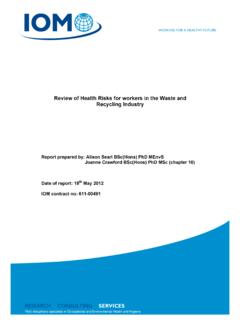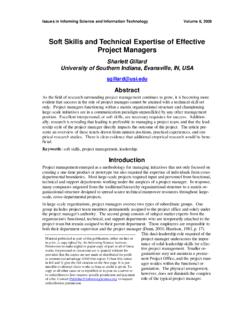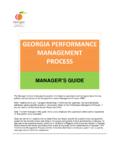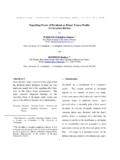Transcription of Work and the Menopause - BOHRF: Homepage
1 work and the Menopause : A Guide for Managers Introduction: Older women workers Women comprise approximately half (47 percent) of the UK s workforce. About million are women aged 50 and over. Occupational health issues for older workers in general, and older women workers in particular, have often been ignored. Many of today s women workers are, or will be, working though a rarely discussed stage of life: the Menopause . The British Occupational Health Research Foundation (BOHRF) commissioned researchers at the University of Nottingham, led by Professor Amanda Griffiths, to explore women s experience of working through the Menopause . The research aimed to explore women s experiences of working through the Menopause , and to provide information for employers, for women and for those who advise them.
2 It is based on interviews with women in managerial and administrative roles in several sectors1, and on responses to over 900 questionnaires. What is the Menopause ? The Menopause is part of the natural ageing process for women. It refers to the time when menstruation has ceased for 12 consecutive months. This occurs naturally between the ages of 45 and 55; the average age in the UK is 52. During the period before the Menopause (peri- Menopause ) these changes lead to menstrual irregularities. Symptoms associated with the Menopause include hot flushes, palpitations, night sweats and sleep disturbance, fatigue, poor concentration, irritability, mood disturbance, skin irritation and dryness.
3 Overall, this period of hormonal change and associated symptoms can last from four to eight years. Some women choose to take hormone replacement therapy (HRT) for some of the Menopause s more troublesome symptoms, whereas others prefer not to medicalise it and see it as a natural life stage. In recent years there has been negative media coverage about possible (although disputed) adverse health effects of HRT which is thought to have led to a fewer women beginning to take it, and an increase in the numbers of those already taking it who stop. The Menopause typically occurs at challenging times in women s lives. They may also be managing chronic health conditions, the risk of which increases with age. Women also usually bear the greater share of domestic responsibilities, child care and care of disabled, chronically ill or elderly partners or parents.
4 Nearly half of respondents in this research reported having children still living at home, and one in five caring for an elderly or disabled relative or person. How does it affect women at work ? In this study, nearly half of the women found it somewhat/fairly difficult to cope with work during menopausal transition, an equal proportion of women did not find it difficult at all. Only five percent reported it to be very or extremely difficult. Nonetheless, menopausal symptoms can pose major and embarrassing problems for some women, leaving them feeling less confident and at odds with their desired professional image. The main problems at work that women attributed to 1 Professional, scientific and technical activities; education; transportation and storage; finance and business; information and communication; wholesale and retail trade; public administration and defence, compulsory social security (UK Standard Industrial Classification of Economic Activities).
5 The Menopause were: poor concentration, tiredness, poor memory, feeling low/depressed and lowered confidence. Hot flushes at work were a major source of distress for many women. Things that made hot flushes more difficult to cope with were working in hot and poorly ventilated environments, formal meetings, and high visibility work such as formal presentations. I am near the window anyway so I just open the window about half an inch and I get a nice breeze and I am fine (Age 53) Some people would say Are you alright? . Well just ignore me. A senior moment , I call it, A senior moment . And they laugh and I (Age 48) Although no objective measures of performance were taken during this research, some women felt their job performance had been negatively affected by the Menopause .
6 And some women said they worked extremely hard to overcome their perceived shortcomings. Nearly a fifth of women thought that the Menopause had a negative impact on their managers and colleagues perceptions of their competence at work , and felt anxious about these perceived performance deficits. It certainly affects my confidence from the point of view of speaking at meetings because I am not as concerns me. I don t want to, you know, suddenly not have the word that I need so I am perhaps sort of withdrawing a little bit (Age 48) How can managers encourage communication about health issues? With any longstanding health-related condition, sympathetic and appropriate support from employers and line management is crucial in order to provide employees with the help they need.
7 It is widely thought that such support encourages employee loyalty and facilitates continued participation in the labour force. But managers can only be sympathetic to these needs and make suitable work adjustments if aware of a problem. People are more inclined to disclose if they regard managers as supportive and there is a culture of openness about health issues. Results from this research showed that some women received considerable understanding and help from their colleagues and managers and it was greatly valued. They believed it enabled them to continue working well and productively. However, in many workplaces there was very little awareness of the Menopause as a potential occupational health issue; it was a taboo topic.
8 Where women had taken time off work to deal with their symptoms, only half of them disclosed the real reason for absence to their line managers. Women were often embarrassed to disclose their problems or feared that their managers would be embarrassed if they raised the subject, particularly if those managers were younger than them or were male. A notable exception was where managers were older men whose wives or partners had experienced the Menopause ; women spoke appreciatively of such managers who were clearly knowledgeable and sympathetic. I am lucky because he (line manager ) is quite understanding and obviously his wife has been through it and so he understands the problems that you can have.
9 I think if I had perhaps a younger line manager it would be more of a problem (Age 54) They would be embarrassed if you told them (men) what was wrong. They don t want to know, do they, about ladies problems, women s problems? (Age 53) I prefer to not have to do it (tell anybody about the Menopause ) because I see it as my business not anybody else s (Age 46) You hear lots about dealing with pregnant women and making sure they are comfortable and safe in their environment so perhaps the same sort of initiative needs to be looked at for menopausal women (Age 50) This study has made it clear that the Menopause presents an occupational health issue for some women, and for a significant period of time.
10 The research has also revealed that women feel awareness and support from employers and managers is very helpful. What can managers do to help? Women had developed many strategies themselves for coping with problematic menopausal symptoms at work , but many of these were dependent on sympathetic employers. Managers should be aware that women may change their habitual working practices to help themselves. I just say I am working at home and then I crash out during the day and then I probably work in the evening. You know, work extra time to catch up (Age 55) If I get a flush I will put the fan on and I open the window slightly (Age 53) I carry a little pad around with me all the time and I write everything down and then I have a little post-it note that I stick on things to remind me (Age 54) Four overarching issues emerged from the research as areas for possible improvements at work .








